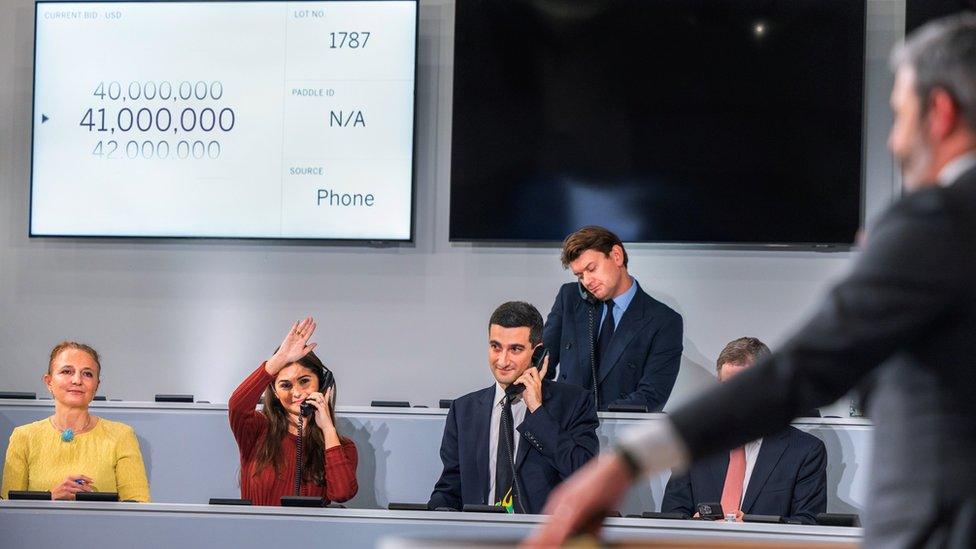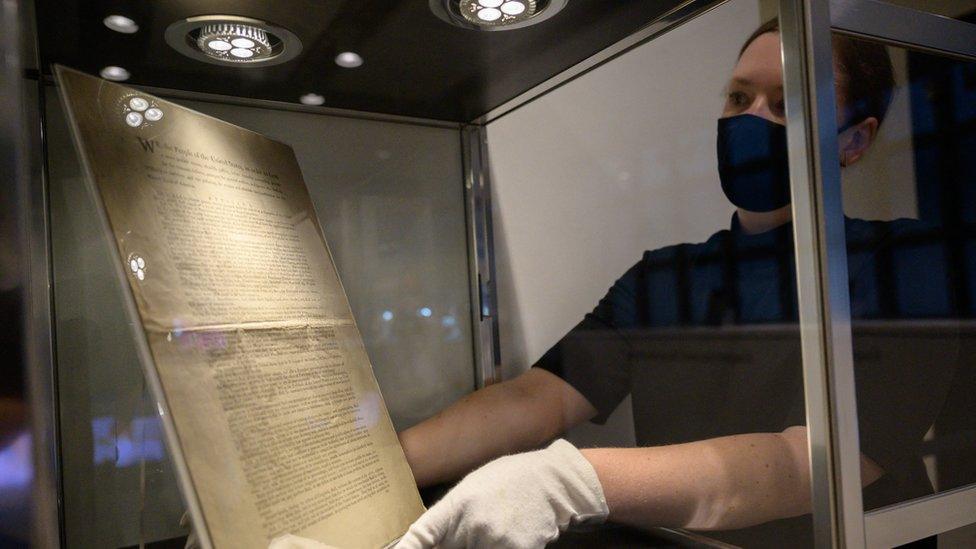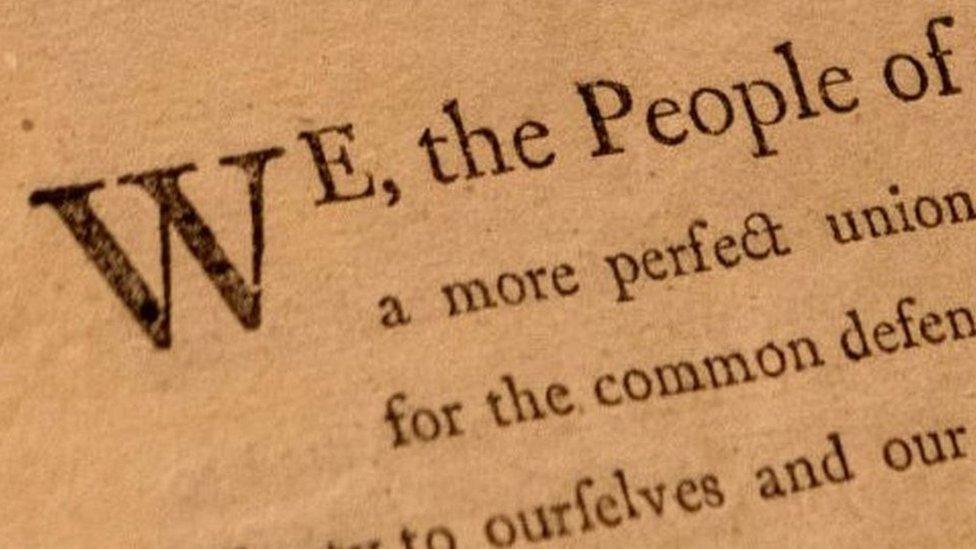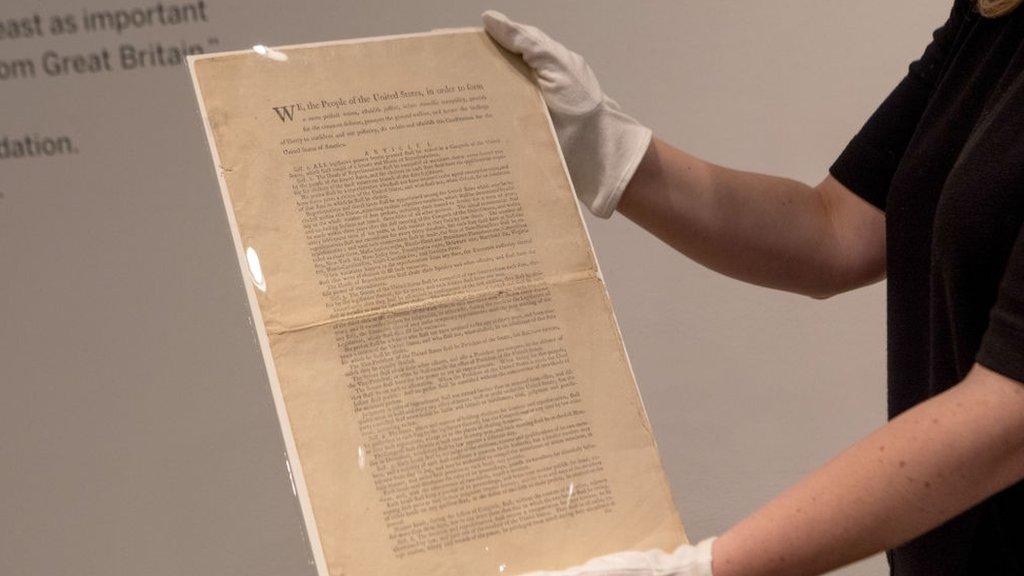Crypto US constitution bidder refunds hit by high fees
- Published

Bidding for the document was more than double the estimate
The people behind a failed bid to buy a rare original copy of the US constitution are facing an avalanche of refunds - up to $40m for 17,000 donors.
The ConstitutionDAO team used a "decentralised" approach - largely unregulated and using cryptocurrency - to amass the fortune.
But large fees for those crypto-transactions are eating up huge sums of money in the refund process.
The group said issuing refunds was its top priority.
It later announced, on its website, the project was closing down, despite originally promising to continue.
"We know that everyone is eager to hear what the next steps for ConstitutionDAO are - and we've been deeply exploring several options," it said.
"While we would very much like to have been able to do so, we have determined that building and maintaining on ongoing project is not something that we as a core team are able to support, given the technical and administrative requirements of doing it properly."
But the group also encouraged investors in the scheme to claim their refunds, saying there was "no time limit".
ConstitutionDAO - short for "decentralised autonomous organisation" - raised the vast sums of money in the Ethereum cryptocurrency to bid on an extremely rare privately-owned copy of the original printing of the US constitution.
The group had promised to maintain the historic document "for the people".
But they were outbid by a private investor, and the document sold for more than double the auction house's original estimate.
Now, some investors in the scheme are reporting that they must pay fees of up to half their refund.
Gas money
That is because the Ethereum network records its transactions on the blockchain, the same basic technology idea that powers other cryptocurrencies such as Bitcoin.
And like Bitcoin mining, it requires computational power to run.
"Gas" is the fee paid to those who run the computer systems to facilitate transactions. And it changes price based on supply and demand.
That means that at times, it can be much more expensive to make any kind of transaction, depending on how busy the Ethereum network is.
And the network has recently seen high usage - and high gas prices.
On its official Discord - the chat app which allows anyone to create rooms and discussion channels for enthusiasts on almost any topic - the group said it had 17,437 donors with a median donation of $206.26.
High gas fees mean that "small" donations could be severely hit by the transaction charge.
One user on the Discord said that in order to get $400 refunded, they would have to pay $168 in gas. Others complained of the fees being higher than the relatively small amount of their refund.
"Wow, lessons learned, [Ethereum] is no good. Gas too high," wrote another in the support channel.
A different contributor lamented that the experience might sour cryptocurrency for those who were not already investors, but got caught up in the drama of "buying the constitution".
"Almost a third of people that contributed are new to [Ethereum] and their first experience is this. Not only that, they'll have to know the pain of paying $200+ in gas for literally nothing," they said.
The future
Senior figures in the Discord- known as delegates - said there was no clear solution.

A Sotheby's employee displays the copy of the US Constitution the group had planned to buy
"We looked at and did everything in our power to come up with a gas-free refund option. However there was nothing that could be set up in a timely manner," wrote one.
"Providing a safe refund process as soon as possible was the primary goal."
Another admin on the server told users: "This was a very, very hard call and we've all been at our computers for the last several days for every waking hour trying to find the least bad option. There was no solution that was going to please everyone."
Bitcoin explained: How do cryptocurrencies work?
The group was only established days before the auction of the historic document by Sotheby's, and so had little time to set up its desired decentralised structure. Instead, a core group of insiders - the delegates - took care of managing the project, writing and rewriting the rules and FAQs as they went.
The group had originally planned to use ownership of digital tokens as a way of allocating voting power over the care and display of the constitution document, and briefly proposed a new type of token to decide its future, external.
Signing off, the group said: "The project was a landmark event that showed the entire world that a group of internet friends can use the power of Web3 to face a seemingly insurmountable goal and achieve incredible results on an impossible timeline."
Related topics
- Published18 November 2021

- Published19 November 2021

- Published30 May 2021

- Published12 February 2018
